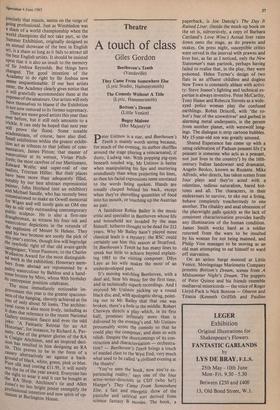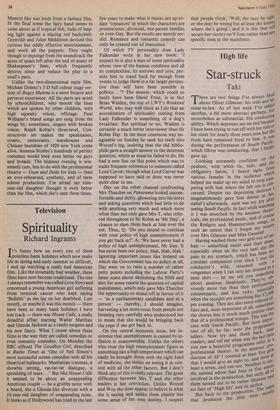Theatre
A touch of class
Giles Gordon
Beethoven's Tenth (Vaudeville) They Came From Somewhere Else (Lyric Studio, Hammersmith) The Comedy Without A Title (Lyric, Hammersmith) Bottom's Dream (Little Venice) Bugsy Malone (Her Majesty's)
Peter Ustinov is a star, and Beethoven's .1L- Tenth is mainly worth seeing because, for much of the evening, its author shuffles
around the stage playing a reincarnated, if dusty, Ludwig van. With popping pig-eyes beneath tousled wig, Mr Ustinov is better when manipulating his lips and muttering soundlessly than when projecting his lines, as then his facial expressions seem unrelated to the words being spoken. Hands are usually clasped behind his back, except when they're shovelling quantities of food into his mouth, or touching up the Austrian au pair.
A fastidious Robin Bailey is the music critic and specialist in Beethoven whose life and household are invaded by the man Himself, hitherto thought to be dead for 212 years. Why Mr Bailey hasn't played more classical leads is a mystery: the RSC could certainly use him this season at Stratford. In Beethoven's Tenth he has many lines to speak but little to achieve beyond explain- ing 1983 to the visiting composer. Dilys Laye as his wife makes the most of an underdeveloped part.
It's moving watching Beethoven, with a deaf aid, hear his music for the first time, and in technically superb recordings. And I enjoyed Mr Ustinov picking up a round black disc and, with apologetic shrug, point- ing out to Mr Bailey that that one was broken, there's a hole in the middle. Robert Chetwyn directs a play which, in its first half, promises infinitely more than is delivered by the evening's end. Mr Ustinov presumably wrote the comedy so that he could play the composer, and does so with relish. Despite the shortcomings of its con- struction and characterisation — orchestra- tion? — Beethoven's Tenth brings a touch of needed class to the West End, very much what used to be called 'a civilised evening at the theatre'.
`You've seen the book, now you're ex- periencing reality,' says one of the four actor-writer-directors in Cliff (who he?)
Hanger's They Came From Somewhere Else, a fast and energetic show of the
pastiche and satirical sort derived from science fantasy B movies. The book, a
paperback, is Joe Danzig's The Day It Rained Liver. (Inside the mock-up book on the set is, subversively, a copy of Barbara Cartland's Love Wins.) Actual liver rains
down onto the stage, as do prawns and snakes. On press night, susceptible critics were served in the interval with prawns and
liver but, as far as I noticed, only the New Statesman's man partook, perhaps having failed to realise that, in the play, they were
poisoned. Helen Turner's design of two flats in an affluent childless and dogless New Town is constantly ablaze with activi- ty: Steve Jeanes's lighting and technical ex- pertise is always inventive. Peter McCarthy, Tony Haase and Rebecca Stevens as a wide- eyed police woman play the confused earthlings. Robin Driscoll, with 'the ro- bot's fear of the screwdriver' and garbed in alarming metal underpants, is the person from another planet, with werewolf long- ings. The dialogue is strip cartoon bubbles. My 15-year-old son was greatly amused.
Shared Experience has come up with a smug celebration of Paduan peasant life Ca peasant is someone who acts as a peasant, not just lives in the country') by the 16th- century Italian landowner and dramatist, Angelo Beolco, known as Ruzante. Mike Alfreds, who directs, has taken scenes from four plays and they're acted with a relentless, tedious naturalism, bared bot- toms and all. The characters, in their endeavours to survive, to eke out a living, behave completely treacherously to one another. The ribaldry and anal obsession of the playwright palls quickly as the lack of consistent characterisation provides hardly any illumination of the human condition. James Smith works hard as a soldier returned from the wars to be insulted by his woman for not being maimed, and Philip Voss manages to be moving as an old man attempting to eat himself to ward off starvation.
On an airless barge moored at Little Venice, Movingstage Marionette Company presents Bottom's Dream, scenes from A Midsummer Night's Dream. The puppets of Peter Quince and his friends resemble mediaeval misericords — the voice of Roger Lloyd-Pack is Nick Bottom — Oberon and Titania (Kenneth Griffith and Pauline
Munro) like war lords from a fantasy film. In the final scene the fairy band seems to swim about as if tropical fish, balls of leap- ing light against a blazing red backcloth. Grenville and Juliet Middleton devised this curious but oddly effective entertainment, and work all the puppets. They ought though to expunge from the soundtrack the acres of space left after the end of many of Shakespeare's lines, which frequently destroy sense and reduce the play to a snail's pace.
Unlike the two-dimensional sepia film, Michael Dolenz's 3-D full colour stage ver- sion of Bugsy Malone is a most bizarre and perverse experience. All the parts are acted by schoolchildren, who mouth the lines which are spoken by other children, with high squeaky voices, offstage. Paul Williams's bland songs are sung from the wings by, sometimes, singers with broken voices. Ralph Koltai's three-level, Con- structivist set makes the speakeasies, streets, restaurants, warehouses and Chinese laundries of 1929 new York come alive. Annena Stubbs's hundreds of perfect costumes would look even better on guys and broads. The hideous evening is win- somely cute, less to do with the professional theatre — Guys and Dolls for kids — than an over-rehearsed, synthetic, end of term school production. I'm afraid my nine- year-old daughter thought it even better than the film, which she's seen three times.















































 Previous page
Previous page